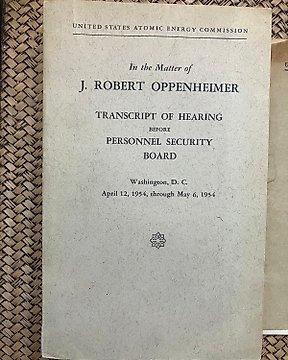
(OPPENHEIMER, J. Robert) - In the Matter of J. Robert Oppenheimer - 1954
編號 82892261

編號 82892261

In the Matter of J. Robert Oppenheimer. Volume I: Transcript of Hearing before Personnel Security Board. Washington, D.C. April 12, 1954, through May 6, 1954. Volume II: Texts of Principal Documents and Letters of Personnel Security Board General Manager Commissioners. Washington, D.C. May 27, 1954, through June 29, 1954.
Two volumes. Octavo, original printed tan wrappers; pp. 993, pp. 67.
First edition of the Atomic Energy Commission publication of the transcript of the Gray Board hearing on Oppenheimer's security clearing, along with the supporting "Texts and Principal Documents," containing select and still controversial 1954 documents and correspondence in the AEC decision to strip Oppenheimer s security clearance a "black mark" on America."Deemed the "father of the atomic bomb,"
Dr. J. Robert Oppenheimer, in the aftermath of Hiroshima and Nagasaki, "became the principal spokesman for a broader public understanding of atomic science and technology" (ANB). In the early 1950s, targeted by Atomic Energy Commission chairman Strauss, the FBI's Hoover and Joseph McCarthy, Oppenheimer faced demands that his security clearance be withdrawn. On May 23, 1954, the Gray Board of the AEC, "deemed Oppenheimer a loyal citizen who was nevertheless a security risk."
As evidenced by the four factors in that decision, printed here, "their reasoning was tortured." On hearing of the decision to rescind Oppenheimer's security clearance, "Einstein, disgusted, quipped that henceforth the AEC should be known as the 'Atomic Extermination Conspiracy' the agony and humiliation that Oppenheimer endured in 1954 were not unique during the McCarthy era. But as a defendant, he was America's Prometheus" (Bird & Sherwin, 540-46, xi). As noted by Ward Evans, whose dissenting opinion to the ruling appears here, the AEC decision stands as "a black mark" on America.
This first edition contains the edited transcript of the hearings (an unredacted text was not published for 60 years) and Texts of Principal Documents, "containing documentation on the Oppenheimer case." When Oppenheimer's lead attorney Garrison belatedly learned of the Texts with no previous AEC notice he promptly wrote AEC chairman Strauss, expressing anger over bias in the omission of certain documents from Texts that would have assured a "close public examination which the national interest requires." In many ways, this publication achieved perhaps the opposite of its intent. Rather than quelling dispute over the AEC decision, publication of the Transcript and the Texts ensured ongoing debate over Oppenheimer and the Cold War, by what was selectively revealed in its pages and what was hidden.
The first title provides a complete transcript of the testimony, as released by the Atomic Energy Commission in 1954, of the hearing called to determine whether Oppenheimer was a ‘security risk’. . Much of the testimony, mirroring the McCarthy hearings at the time, focused on Oppenheimer’s relationships with members and supporters of the Communist Party and his expressed opinions as a government advisor on used of nuclear bombs and his opposition to creation of a hydrogen bomb. Oppenheimer considered the decision to build such a boom to be both futile and immoral.
The AEC found against Oppenheimer. The decision was vacated in December 2022 by Secretary of Energy Jennifer Granholm. As well as highlighting government practices of the time, it reveals a great deal about the life and character of one of the twentieth century's most important scientific figures.
Significant parts of these transcripts were adapted into the screenplay of Christopher Nolan's 2023 film ‘Oppenheimer’. The whole episode has been widely studied, e.g. Richard Polenberg In the Matter of J. Robert Oppenheimer: The Security Clearance Hearing (2002); Philip M. Stern, The Oppenheimer Case (1969); J Barton Bernstein, ‘The Oppenheimer Loyalty-Security Case Reconsidered’, Stanford Law Review 42/6 (1990): 1383–1484.
.Text generally fine. The wrapper on the larger book are impeccable. Those on the smaller one are fragile and loose on the spine.